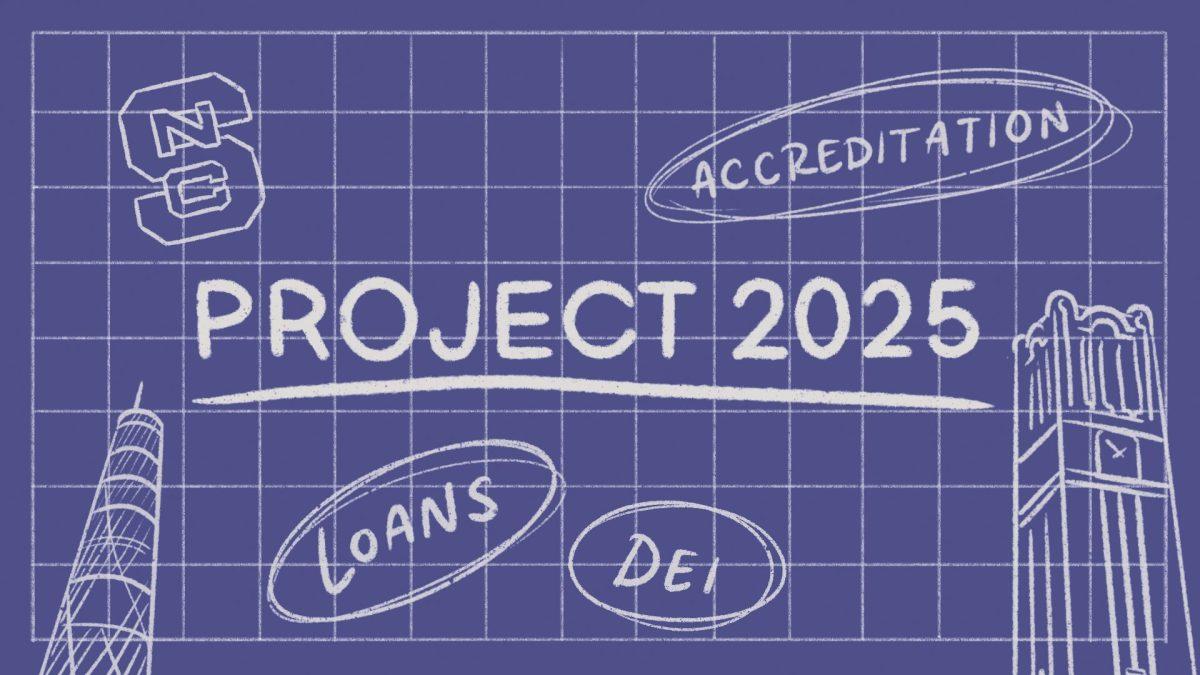
Graphic Lucy Osborn
As the 2024 presidential election approaches, discussions surrounding Project 2025 are gaining momentum as several provisions of the plan could impact the world of academia and the lives of college students.
Project 2025 is a plan developed by conservative groups, led by the Heritage Foundation, that seeks to reshape the federal government, largely reducing its size and increasing the influence of the executive branch. It includes proposals to cut the total number of federal employees, transfer power from career civil servants to political appointees and dismantle or scale back federal agencies.
Steven Greene, a professor in the political science department, said part of this plan involves abolishing the Department of Education, while still aiming to keep its programs.
“They’re talking about moving the key elements of the Department of Education, the key things that it does, to other departments,” Greene said. “They’re not saying ‘we’re going to stop the government doing these things,’ but ‘we’re going to eliminate the Department of Education.’”
Greene said much of the drive to pull resources away from the Department of Education is under the perception of universities as “left-wing indoctrination machines,” particularly fueled by universities embracing DEI policies. Greene said Project 2025 includes plans to limit DEI programs across the nation, akin to the UNC Board of Governors’ removal of DEI offices as a requirement at every member university.
“We’ve seen a number of state laws and state actions to limit DEI in universities, including right here in North Carolina,” Greene said. “What they would want to do is be able to kind of place those limits on an entirely national basis.”
While Project 2025 intends to preserve the Department of Education’s programming, the programming itself would go through heavy edits, including the redefining of accreditation, changes to student loan policies and the “[rejection of] gender ideology and critical race theory,” according to Project 2025 itself.
Project 2025 takes aim at several student loan policies implemented by the Biden administration. The plan calls for reversing student loan forgiveness and the 2010 student loan federalization.
Greene said students looking to enter the public service workforce could be impacted the most by Project 2025’s loan forgiveness plans.
“There’s a part of student loan forgiveness for people who go into teaching and other public service jobs,” Greene said. “I suspect that there’s a lot of conservatives who would be happy with that policy as well, and it just kind of gets swept up in it.”
While changes to the Department of Education would affect NC State students, Greene said changes specific to that department wouldn’t be what affected students most.
“It’s the abortion provisions,” Greene said. “It’s young people at peak productive ages, especially when they’re in college. … So the provisions really try to essentially prevent abortion on an entirely national level. Not clear how successful they would be, but they’re interested in trying their darndest to ban abortion nationwide, to make it extremely difficult, if not impossible, to obtain abortion medication, which is now how the majority of abortions occur.”
Abortion is one issue potentially impacted by Project 2025, but Michael Struett, a professor in the political science department, said climate change stood out alongside it as a potential concern for college students.
“We need to continue to make very large societal investments in adapting to a sustainable energy future,” Struett said. “The eight years of the George W. Bush administration were already a major delay in making those adjustments, and the four years of the Trump administration were a major delay. To have another delay like that, I think, could have catastrophic consequences on the climate change front.”
Although former President Donald Trump has publicly denounced having any association with the project, both Greene and Struett believe this to be disingenuous.
“It’s not entirely credible,” Greene said. “The reality is, the people doing this are absolutely in his orbit and who he has worked closely with.”
While much of Project 2025 could be implemented through executive action, some aspects would require congressional approval. Struett said the document aims to accomplish as much as possible through the executive branch without needing legislation.
“Whether it’s about quashing pro-Gaza-Palestinian protesters, or excluding transgender athletes from competitions or whatever the issue of the moment is, they’re going to use those levers of power, and that’s what they figured out,” Struett said. “And they’re trying to think about ‘how do we tighten these things up to give the executive branch in the U.S. more direct control over wide swaths of American society.’”
Struett said while all of these changes are impactful in their own right, it’s ultimately how they work together that impacts NC State students as well as the nation as a whole.
“You have to remember, all these things are happening all at once,” Struett said. “It’s not just about how accreditation works for universities, it’s about how accreditation works and how much executive power there is in a world where the president legally can’t be convicted of a crime.”